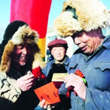CPPCC FAQs
- What kind of meeting mechanisms does the CPPCC employ?
- Meeting mechanism employed by the CPPCC include: the plenary sessions of the CPPCC National Committee or local committees, Standing Committee meetings, meetings of the chairmen, meetings of the secretary-generals, and meetings of the special committees.
- What are CPPCC motions and proposals?
- Motions refer to opinions and proposals on major issues covering state or local policies and social life put forward by members of CPPCC to CPPCC organizations and to the people's congress and people's government.
- Which parties and organizations can join the CPPCC?
- All political parties and public organizations that support the CPPCC charter may sit on the National Committee, after deliberation and approval by the Standing Committee of the CPPCC National Committee.
- Who participates in the management of state affairs?
- Various non-Communist political parties, democrats with no party affiliations and patriotic people are invited to take part in discussions on the management of state affairs.
- What form of democratic supervision does the CPPCC provide?
- Resolutions adopted by the plenary sessions of the CPPCC National Committee or Standing Committee, etc..
- What are the general principles guiding the work of CPPCC?
- Political consultation means that CPPCC conducts consultations on the country's basic policies and important issues relating to political, economic, cultural and social affairs before a decision is made and implemented.
- What's the difference between motions from CPPCC members and bills from deputies of people's congress?
- Motions from CPPCC members differ from bills of people's congress deputies. The people's congress is a body of power. A bill has legal effect once it has been adopted.
- When did representatives from non-state-owned enterprises first become members of the CPPCC National Committee?
- In March 1993, over 20 presidents and general managers from private businesses and joint ventures attended the First Plenary Session of the Eighth National Committee of CPPCC, representing the non-state economic sector.
- At which meeting do members of the National Committee and local committees of the CPPCC have the right to vote and stand for election? What other rights do they have?
- Members of the CPPCC National Committee and local committees have the right to vote and stand for election at meetings of CPPCC. They also have the right to voice their opinions and offer criticism on the work of CPPCC.
- What are the duties of CPPCC members?
- Abiding by the CPPCC charter, etc..
5316f3a5-a2e2-4786-8b9a-f4b8a8fb98e4.jpg)
- China.org.cn presents a live coverage of the opening ceremony of the first session of China's 13th National People's Congress (NPC) on the morning of March 5, 2018.
亚洲精品久久久久久一区二区_99re热久久这里只有精品34_久久免费高清视频_一区二区三区不卡在线视频
欧美日韩一区二区免费在线观看
|
亚洲欧美久久久|
亚洲破处大片|
亚洲高清在线|
久久精彩视频|
亚洲福利久久|
久久精品国产综合|
亚洲第一天堂av|
亚洲国产岛国毛片在线|
亚洲韩国青草视频|
最新成人av网站|
亚洲日本成人网|
亚洲茄子视频|
日韩一区二区精品葵司在线|
日韩视频中文|
亚洲视频播放|
亚洲欧美综合另类中字|
性欧美大战久久久久久久免费观看|
亚洲欧美日韩中文在线制服|
香蕉乱码成人久久天堂爱免费|
香港久久久电影|
久久精品亚洲热|
久久免费高清|
欧美大片在线观看一区二区|
欧美日本韩国一区二区三区|
欧美日韩一区视频|
国产精品视频久久|
国产一区二区日韩精品欧美精品|
国产专区一区|
在线成人av网站|
最新日韩欧美|
亚洲视频在线二区|
午夜伦欧美伦电影理论片|
久久se精品一区二区|
亚洲欧洲一区二区三区|
avtt综合网|
午夜精品久久99蜜桃的功能介绍|
久久av红桃一区二区小说|
老牛嫩草一区二区三区日本|
欧美精品一区在线发布|
国产精品久久久久91|
国产亚洲欧美一级|
亚洲国产欧美一区二区三区丁香婷|
亚洲久久成人|
亚洲永久免费观看|
亚洲国产精品传媒在线观看|
一本色道久久综合亚洲精品小说|
亚洲永久视频|
久久在线播放|
欧美午夜欧美|
国内外成人免费激情在线视频|
亚洲国产精品一区在线观看不卡|
日韩视频在线免费|
欧美一区二区三区视频免费播放|
亚洲欧洲综合|
先锋影音网一区二区|
欧美不卡视频一区发布|
欧美性一区二区|
黄色成人在线免费|
亚洲天堂av在线免费观看|
亚洲国产精品悠悠久久琪琪|
亚洲视频精品在线|
老色鬼精品视频在线观看播放|
欧美日韩一区三区|
影音先锋久久|
亚洲午夜一级|
亚洲毛片网站|
久久精品五月婷婷|
欧美日韩一区二区三区四区五区|
国内精品美女在线观看|
一区二区精品|
亚洲国产精品久久91精品|
亚洲在线观看免费视频|
裸体一区二区三区|
国产精品私拍pans大尺度在线|
91久久久国产精品|
欧美一区二区三区在线观看|
中国成人黄色视屏|
美女国产一区|
国产视频不卡|
亚洲一级二级|
这里只有精品视频|
欧美jizzhd精品欧美巨大免费|
国产欧美日韩在线视频|
日韩视频一区二区三区在线播放免费观看
|
欧美www视频在线观看|
国产欧美一区二区三区另类精品|
亚洲精品久久久蜜桃|
亚洲第一在线综合在线|
欧美在线一二三区|
黄色亚洲精品|
亚洲电影在线播放|
性欧美videos另类喷潮|
亚洲天堂av图片|
欧美激情精品久久久久|
红桃视频一区|
欧美一级久久|
亚洲一区区二区|
欧美日韩国产首页在线观看|
亚洲电影第三页|
亚洲国产精品美女|
久久久国产精品一区|
国产精品美女久久久浪潮软件
|
亚洲精品国产精品国自产在线
|
亚洲天天影视|
欧美极品aⅴ影院|
国内在线观看一区二区三区|
香蕉久久国产|
性欧美大战久久久久久久久|
国产精品理论片|
在线亚洲激情|
亚洲先锋成人|
欧美日韩在线观看一区二区|
亚洲乱码一区二区|
一本色道久久综合狠狠躁篇怎么玩
|
日韩一级免费|
欧美人在线视频|
亚洲人www|
亚洲免费观看高清在线观看
|
99国产精品99久久久久久|
av72成人在线|
欧美日韩亚洲激情|
一本久久a久久精品亚洲|
亚洲视频一二三|
国产精品v片在线观看不卡|
亚洲私拍自拍|
亚洲欧美在线另类|
国产麻豆91精品|
欧美一级久久久|
久久久精品欧美丰满|
狠狠色综合网|
亚洲国产日韩美|
欧美精品成人91久久久久久久|
亚洲人成艺术|
中日韩美女免费视频网址在线观看|
欧美少妇一区|
亚洲综合日韩在线|
欧美在线黄色|
国内精品久久久久久|
亚洲欧洲一二三|
欧美日韩视频在线第一区|
亚洲素人一区二区|
久久精品人人做人人爽|
激情久久综合|
一区二区精品|
国产欧美亚洲视频|
亚洲电影免费观看高清完整版|
欧美成人精品h版在线观看|
亚洲人妖在线|
亚洲欧美国产日韩天堂区|
国产亚洲电影|
亚洲精品在线观|
国产精品大片免费观看|
欧美有码在线观看视频|
欧美精品 国产精品|
中日韩视频在线观看|
久久精品在线|
亚洲区欧美区|
欧美在线啊v一区|
在线观看视频亚洲|
亚洲午夜一区|
激情欧美丁香|
亚洲免费婷婷|
在线观看欧美|
亚洲一区二区三区免费在线观看|
国产日韩一区欧美|
日韩亚洲精品视频|
国产精品日韩在线播放|
亚洲精品欧美日韩|
国产精品视频免费在线观看|
亚洲成在人线av|
国产精品成av人在线视午夜片|
久久精彩视频|
欧美性色综合|
亚洲国产精品一区二区尤物区|
欧美丝袜一区二区三区|
欧美专区在线播放|
欧美吻胸吃奶大尺度电影|
亚洲丰满在线|
国产精品女主播一区二区三区|
亚洲国产精品v|
国产精品免费福利|
亚洲美女淫视频|
国产午夜精品视频免费不卡69堂|
99精品国产在热久久婷婷|
国产一区二区三区久久|
亚洲一二三四久久|
在线观看成人av|
午夜精品视频在线观看一区二区|
亚洲国产成人精品视频|
久久精品国产99|
亚洲视频专区在线|
欧美另类视频|
亚洲国产精品久久久久秋霞蜜臀
|
亚洲精品看片|
国产日韩欧美自拍|
亚洲摸下面视频|
91久久久久久国产精品|
久久久一本精品99久久精品66|
亚洲天堂成人|
5316f3a5-a2e2-4786-8b9a-f4b8a8fb98e4.jpg)



